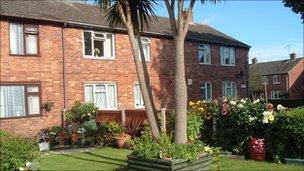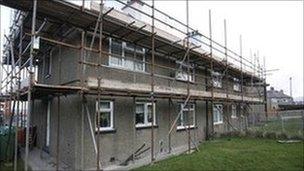Welsh council house quality 'postcode lottery' warning
- Published

Wrexham council says it may struggle to fund improvements to houses on estates like Caia Park
Variations in the quality of council housing across Wales could grow wider, according to a BBC investigation.
The 22 local authorities must find £3bn to bring estates up to the new Welsh Housing Quality Standard (WHQS) by 2012 and another £4bn to maintain it.
Many tenants who have been transferred to a housing association are already seeing improvements, while some councils are struggling to raise funds.
Eye on Wales is on BBC Radio Wales on Sunday at 1300 BST.
The warning comes as the deadline approaches for social landlords to comply with the quality measure, designed to do away with such "postcode lotteries".
The WHQS was launched in 2002 by the Welsh Assembly Government - which is now named the Welsh Government - and it gave all councils and registered social landlords ten years to reach the standard.
A recent report suggests that most, but not all, will achieve that goal by the end of the next financial year.
Keith Edwards, director of the Chartered Institute of Housing Cymru, says the WHQS was "a very basic standard, it's not gold-plated in any shape or form."
"It's about people having decent kitchens, decent bathrooms, well-insulated homes and the areas around their homes as well being good environments to live in - which is an improvement on the equivalent standard in England."
The estimate was that £3bn was needed to reach the standard by 2012 and a further £4bn to sustain the standard over 25 years.
Six Welsh councils calculated that they could they find the money from their own coffers, supplemented with bank loans.
Stock transfer
Other authorities have embarked on a process known as stock transfer, where tenants are balloted on moving to a housing association that would be freer to finance the levels of investment required.
In Conwy, tenants narrowly voted in favour of transfer to a social landlord - Cartrefi Cymru has now embarked on a £30m investment which is already transforming people's houses.
Val Roberts, a tenant in Old Colwyn who has had her kitchen updated with bathroom and external improvements to follow, said the difference was "absolutely stunning".
However, Wrexham is struggling to find investment funds as one of three local authorities - along with Swansea and the Vale of Glamorgan - whose tenants have voted to reject stock transfer.

Housing associations have more freedom than councils to borrow money to upgrade their stocks
Andy Lewis, head of housing for Wrexham, said: "We're a long way away from meeting WHQS. Just on kitchens and bathrooms, we will only have a few hundred houses that will meet the standard."
He said he was hopeful that a review of the housing subsidy system would allow Wrexham to recoup more of the £11m in rent receipts it hands over to the UK Treasury via the Welsh Government.
It currently receives back £7m in the form of a major repairs allowance.
"There's a shortfall there of £4m," he said.
"If there's any way that some of that can be retained within the authority, we can use that to invest in the stock, and possibly borrow money to make these improvements," he said.
Keith Edwards of CIH Cymru agreed that without a "fairer settlement" for councils like Wrexham, tenants could suffer.
"I don't think the issue is essentially around the intricacies of the finances," he said.
"It's much more about the fact that you are going to have people in neighbouring authorities having different standards of accommodation really, quite stark differences, as time progresses."
Eye on Wales is on BBC Radio Wales on Sunday 6 June at 1300 BST.
- Published18 November 2010
- Published16 November 2010
- Published21 July 2010